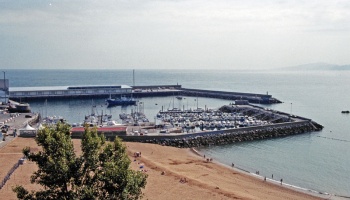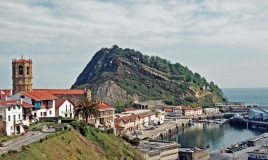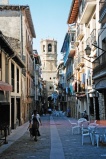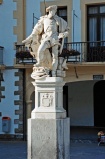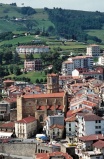Guetaria
From CruisersWiki
| Guetaria or Getaria
| |
| | |
The port of Guetaria, nine miles west of San Sebastian on the coast of NW Spain, is built on an isthmus connecting the land to the island of San Anton, more popularly known as El Raton (the mouse), on account of its shape. The town dates from 1209 and is one of the oldest settlements in the Basque region. Although substantially ruined during the Peninsular Wars, the town retains a wonderful Gothic church of San Salvador built over a passageway up from the harbour. Its most famous son is Juan Sebastian de Elcano, who sailed with Magellan as navigator on the epic voyage of circumnavigation of 1519-22. Elcano brought the ragged remnants of the expedition home to Spain after Magellan’s death in the Philippines, becoming the first man to sail round the globe. The port has a small marina in the outer harbour as well as mooring buoys for larger vessels.
Charts
- British Admiralty
- 1292 - Mimizan-Plage to Cabe de Ajo
- 1171 - Ports on E part of N coast of Spain
- Imray
- C42 - La Rochelle to Santander
Weather
Guetaria is sheltered from the prevailing SW Biscay winds. Fog is an occasional problem during spring and autumn.
Sources for Weather forecasts: See main page for Spain.
Passages
List popular passages/routes, timing, etc.
Islands
The island of San Anton (El Raton) is joined to the land by a narrow isthmus.
Communication
Add here VHF channel for the coastguard, harbor masters. etc.
Also see Cruiser's Nets
No dangers in the approach. The lighthouse on the end of El Raton is a conspicuous landmark. Once identified by the long eastern breakwater, the harbour is entered from the south.
Berthing
The harbour authorities are very relaxed here (if not invisible). If you pick up a buoy in the outer harbour it is unlikely you will be accosted at all. There are usually a few spaces in the marina which occupies the southern half of the harbour - berth where convenient and wait for further instructions. The inner harbour is usually occupied by fishing boats, though there is nothing to stop a yacht tying up alongside here if there is space.
Marinas & Yacht Clubs
There are several large buoys in the outer harbour to which a yacht can moor - ideally fore and aft if two are available. This is the best option for larger yachts or if you want peace and quiet. In the southern part of the harbour, separated by a long pontoon, is a small marina which has around 300 pontoon berths. Maximum length is 14 metres. The marina has water and electricity and toilets and showers are nearby. There is reportedly a fuel station in the inner harbour.
Anchorages
In settled weather, it is possible to anchor off the beach to the SE of the harbour. Anchor in 6.0 - 10.0 metres in sand and weed. Sheltered from the prevailing SW winds, but open to winds from N round to SE.
Amenities
| Facilities | |
|---|---|
| Water | On the pontoons in the inner harbour |
| Electricity | On the pontoons in the inner harbour |
| Toilets | ? |
| Showers | ? |
| Laundry | N/A (Not Available) |
| Garbage | A few bins near the harbour |
| Supplies | |
| Fuel | A fuel station reported in the inner harbour. |
| Bottled gas | ? |
| Chandlers | Effectively nothing except small hardware stores |
| Services | |
| Repairs | N/A |
| Internet | ? |
| Mobile connectivity | ? |
| Vehicle rentals | N/A |
Provisioning
Only small provisions shops in the town.
Eating out
The restaurants here are famous for fish, although you will also find on offer the Basque specialty of chuletas de ternera (huge veal steaks grilled to perfection).
Transportation
List transportation (local and/or international.)
Tourism
The town is picturesquely situated and the passageway up from the port beneath the church of San Salvador dates from the mediaeval period. The church of San Salvador is plain but very unusual, being built on several different levels.
A walk up the main street of the town brings you to the statue of the famous circumnavigator Juan Sebastian de Elcano at the top. Among the remarkable discoveries recorded on his voyages were ‘camels without humps’ (probably guanacos) and ‘black goose’ which needed to be 'skinned rather than plucked' (presumably penguin).
A walk to the lighthouse on El Raton is rewarded with excellent views, as well as ending at a good site for a picnic.
Friends
Contact details of "Cruiser's Friends" that can be contacted for local information or assistance.
Forums
List links to discussion threads on partnering forums. (see link for requirements)
Links
References
See Spain.
Comments
We welcome users' contributions to the Wiki. Please click on Comments to view other users' comments, add your own personal experiences or recommend any changes to this page following your visit.
Verified by
Date of member's last visit to Guetaria and this page's details validated:
- July 2000 --Atheneoflymington
| This is a usable page of the cruising guide. However, please contribute if you can to help it grow further. Click on Comments to add your personal notes on this page or to discuss its contents. Alternatively, if you feel confident to edit the page, click on the edit tab at the top and enter your changes directly. |
| |
|---|
|
Names: Athene of Lymington |
